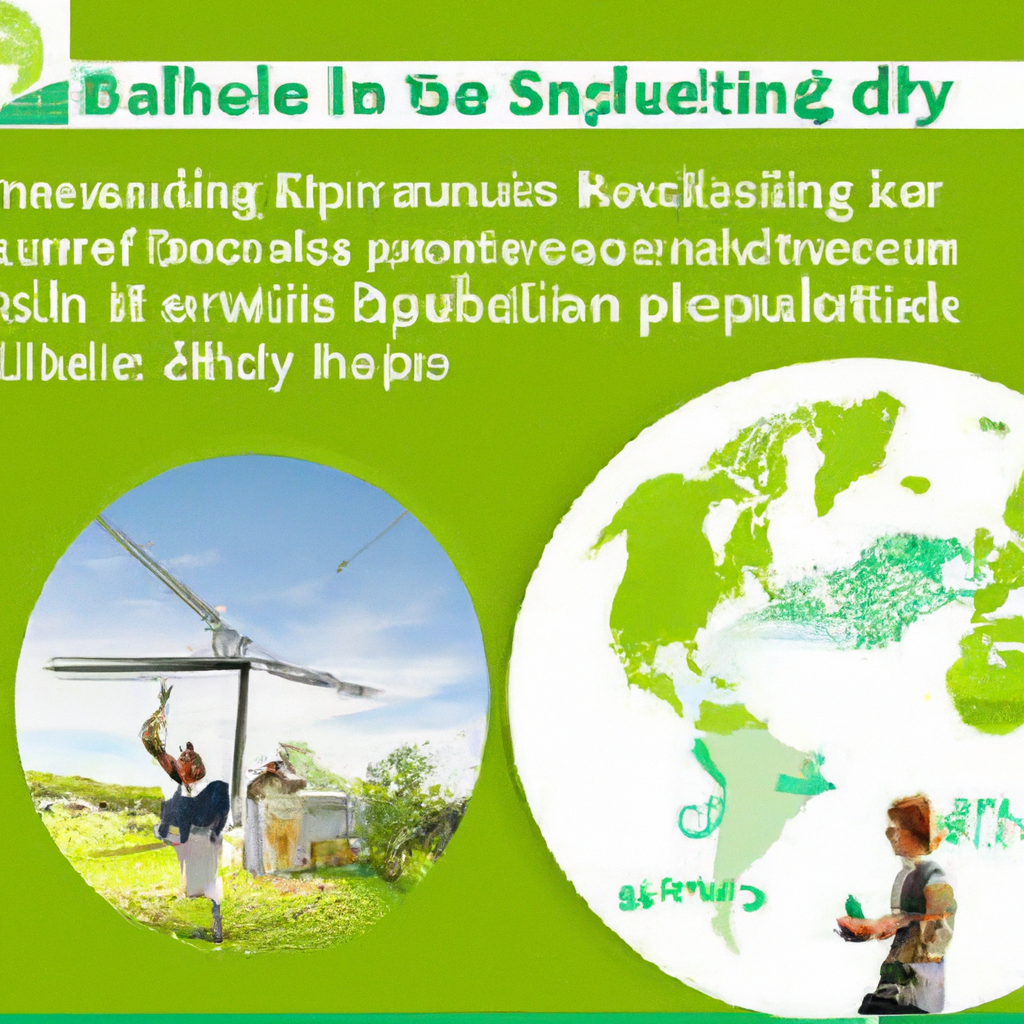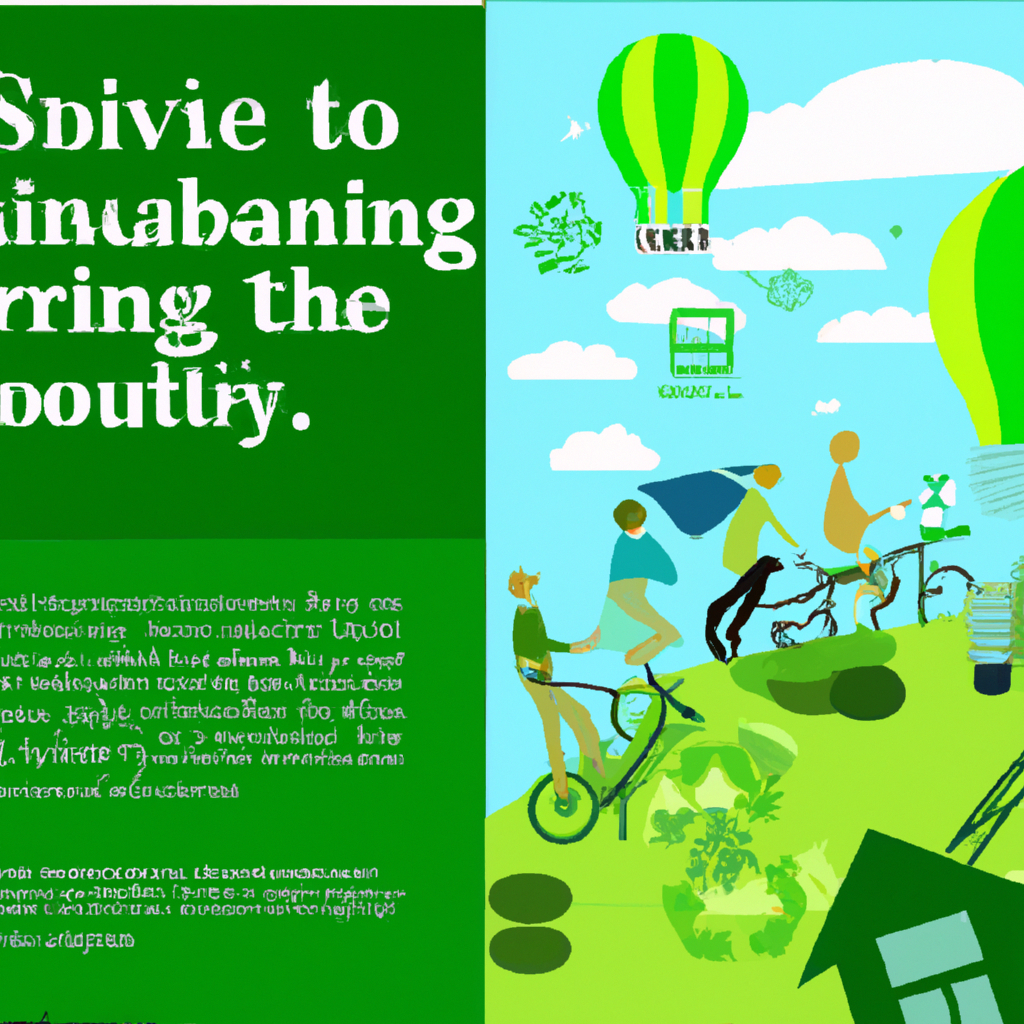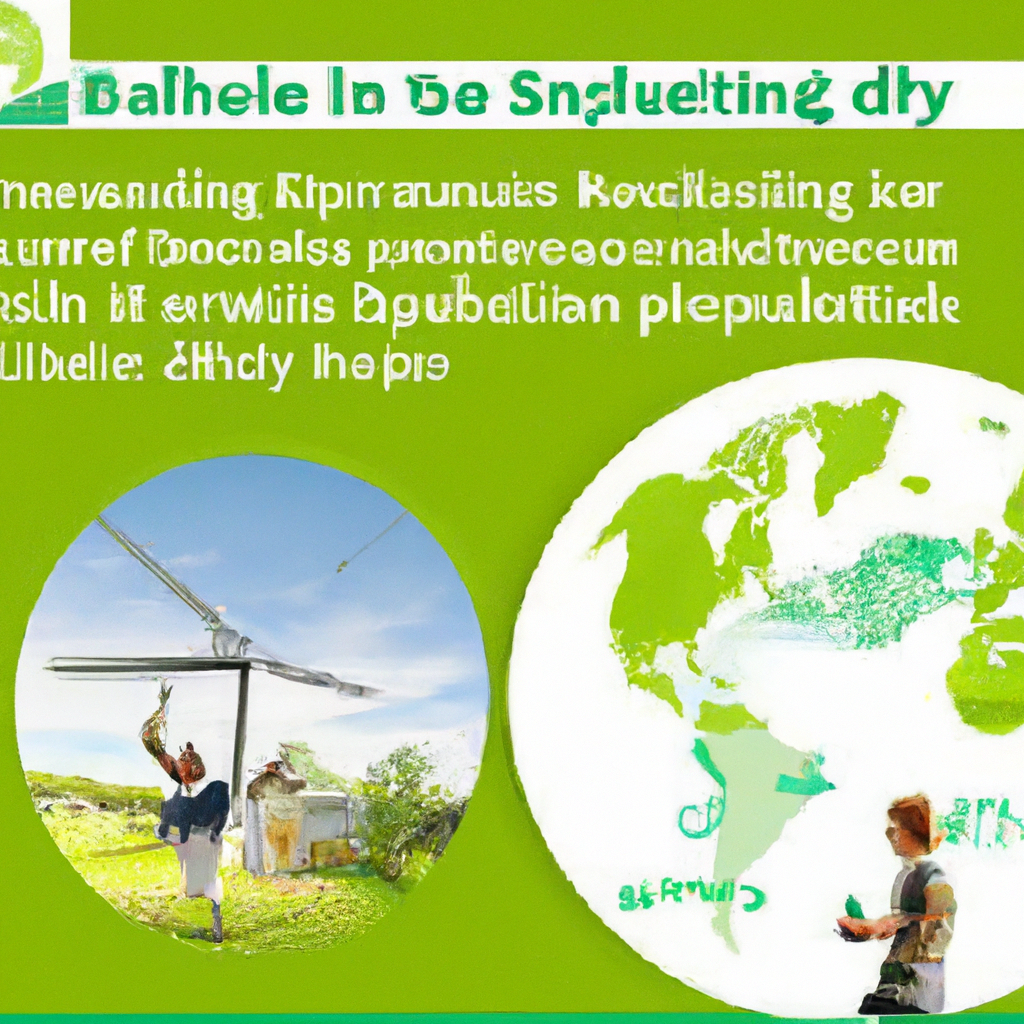Are you curious about the financial advantages that come with adopting a sustainable lifestyle? Look no further! In this article, we will explore the economic benefits of sustainable living and how it can positively impact your wallet. From reducing energy bills to saving on transportation costs, sustainable living not only benefits the environment but also provides financial incentives that can lead to a more secure and prosperous future. So, get ready to discover how embracing sustainable practices can contribute to both your wallet and the planet!

The Importance of Sustainable Living
In today’s world, sustainable living has become increasingly crucial for the well-being of our planet and future generations. Sustainable living encompasses the adoption of mindful practices that minimize harm to the environment, promote resource conservation, and enhance overall quality of life. By making sustainable choices in various aspects of life, we can contribute to a healthier planet and enjoy a multitude of economic benefits.
The Definition of Sustainable Living
Sustainable living is the practice of making conscious choices to reduce our environmental impact and preserve natural resources. It involves incorporating environmentally-friendly habits into our daily lives, such as conserving energy, minimizing waste generation, choosing sustainable modes of transportation, and supporting local businesses. By prioritizing sustainable living, we can create a more sustainable future for ourselves and our communities.
The Global Need for Sustainable Living
The challenges posed by climate change, depletion of natural resources, and pollution are not limited to specific regions or countries. They are global issues that require collective action. Sustainable living plays a vital role in addressing these challenges and striving towards a more sustainable and resilient planet. By embracing sustainable practices, we can contribute to the global effort to combat climate change, preserve biodiversity, and safeguard our planet for future generations.
The Link Between Sustainable Living and Economic Benefits
Contrary to popular belief, sustainable living not only benefits the environment but also brings about significant economic advantages. By adopting sustainable practices, we can stimulate local economies, reduce energy consumption and costs, enhance property values, promote resource conservation, support local farmers, and enjoy numerous other economic benefits. Let us delve into some specific areas where sustainable living can generate positive economic impacts.
Supporting Local Economies
Stimulating Local Business Growth
When you choose to support local businesses instead of multinational corporations, you contribute to the growth and vitality of your local economy. Local businesses often prioritize sustainable and ethical practices, supporting environmental protection and local communities. By shopping at local stores and dining at locally-owned restaurants, you help strengthen the local economy, create job opportunities, and foster a sense of community pride and resilience.
Creating Job Opportunities
Sustainable living promotes the development of industries that specialize in eco-friendly products and services. The increased demand for sustainable goods creates new job opportunities in fields such as renewable energy, recycling, organic farming, and eco-tourism, among others. By fostering the growth of these sectors, sustainable living not only helps address environmental challenges but also creates a diverse range of employment opportunities and promotes economic stability.
Reducing Income Inequality
By supporting local businesses and encouraging sustainable practices, we can contribute to reducing income inequality within our communities. Local businesses often prioritize fair wages, employee rights, and community involvement. When we choose to support these businesses, we indirectly contribute to fairer income distribution and the well-being of workers in our community. Sustainable living thus becomes a powerful tool in promoting a more equitable society.
Energy Efficiency and Cost Savings
Adopting Renewable Energy Sources
One of the cornerstones of sustainable living is the use of renewable energy sources. By incorporating solar panels, wind turbines, or geothermal systems into our homes, businesses, and public infrastructure, we can harness clean and abundant energy while significantly reducing our reliance on fossil fuels. Not only does this help combat climate change and reduce pollution, but it also provides long-term cost savings due to the durability and low operational costs of renewable energy systems.
Reducing Energy Consumption and Costs
Sustainable living encourages the adoption of energy-efficient practices to minimize energy consumption in our daily lives. Simple actions such as using energy-efficient appliances, properly insulating homes, and turning off lights and electronics when not in use can make a significant difference. By reducing our energy consumption, we can lower our energy bills, saving money in the long run while also conserving valuable natural resources.
Lowering Electricity Bills
In addition to reducing energy consumption, sustainable living can also help lower electricity bills. By making energy-efficient choices, such as switching to LED light bulbs or installing smart thermostats, we can optimize energy usage and reduce the amount of electricity needed to power our homes. Over time, these small changes can lead to substantial savings in electricity costs, providing us with more financial freedom while minimizing our impact on the environment.

Waste Reduction and Recycling
Reducing Waste Generation
Sustainable living emphasizes the importance of waste reduction through conscious consumer choices and mindful waste management practices. By reducing our overall consumption, practicing responsible packaging choices, and opting for reusable or recyclable products, we can significantly minimize the amount of waste we generate. This not only conserves valuable resources but also reduces the strain on landfill capacities and waste management systems, resulting in cost savings for both individuals and communities.
Promoting Recycling and Circular Economy
Incorporating recycling into our daily lives is a fundamental aspect of sustainable living. Recycling reduces the need for raw material extraction, saves energy, lowers greenhouse gas emissions, and conserves natural resources. By actively participating in recycling programs and supporting businesses that embrace circular economy practices, we contribute to a more sustainable society while also reducing waste management costs for municipalities.
Decreasing Disposal Costs
Proper waste management can be expensive for local governments and communities. By embracing sustainable living practices focused on waste reduction, recycling, and composting, we can help decrease disposal costs associated with landfill maintenance and waste transportation. These cost savings can then be allocated to other important community initiatives, enhancing overall economic growth and improving the quality of life for residents.
Health and Wellness Benefits
Reducing Healthcare Expenses
Sustainable living practices have a direct positive impact on our health and well-being. By reducing pollution and exposure to harmful chemicals, sustainable living contributes to lower rates of respiratory and cardiovascular diseases, allergies, and other health issues. As a result, healthcare expenses can be significantly reduced, benefiting both individuals and the overall healthcare system, and freeing up financial resources for other essential needs.
Improving Indoor Air Quality
Indoor air quality has a profound effect on our health and productivity. Sustainable living promotes the use of non-toxic cleaning products, proper ventilation, and the reduction of indoor pollutants to create healthier living and working environments. Improving indoor air quality can help reduce the prevalence of respiratory illnesses, allergies, and other health concerns, resulting in lower healthcare costs and increased overall well-being.
Enhancing Productivity and Happiness
Living in sustainable environments that prioritize access to nature, green spaces, and clean air can have a positive impact on our mental and emotional well-being. Studies have shown that exposure to nature and sustainable living practices can reduce stress levels, improve cognitive function, boost creativity, and enhance overall happiness. By incorporating sustainable elements into our daily lives, we can experience improved productivity and a greater sense of fulfillment.
Transportation and Commuting
Investing in Sustainable Transportation
Transportation is a significant contributor to greenhouse gas emissions and air pollution. Sustainable living encourages the use of eco-friendly transportation options such as walking, cycling, carpooling, and public transportation. By reducing our reliance on individual car usage and adopting sustainable transportation practices, we can decrease fuel consumption, reduce emissions, and alleviate the burden on our transportation infrastructure.
Reducing Fuel Costs
One of the economic benefits of sustainable living in the context of transportation is the reduction in fuel costs. By choosing energy-efficient vehicles or utilizing alternative fuel sources, such as electric or hybrid cars, we can significantly lower our fuel expenses. Additionally, incorporating sustainable transportation options like public transit or cycling into our daily commute can lead to substantial savings on fuel costs over time.
Alleviating Traffic Congestion
Sustainable living actively promotes the reduction of traffic congestion in urban areas. By embracing alternative modes of transportation, such as walking or cycling, for short trips and utilizing public transit networks, we can decrease the number of vehicles on the road and alleviate traffic congestion. This not only improves commute times and reduces stress but also leads to cost savings associated with fuel consumption and vehicle maintenance.
Property Value and Real Estate
Increasing Property Values
Properties that prioritize sustainable features and energy efficiency tend to have higher market values. Incorporating green building practices, such as solar panels, energy-efficient appliances, and sustainable materials, can significantly increase property values. Sustainable living choices, such as rainwater harvesting systems and efficient insulation, can also enhance a property’s attractiveness to potential buyers or tenants and lead to higher resale or rental prices.
Attracting Sustainable Buyers and Tenants
In recent years, there has been a growing demand for sustainable housing options. Forward-thinking buyers and tenants are increasingly seeking properties that have eco-friendly features and prioritize sustainable living. By adopting sustainable practices and incorporating green features into our properties, we can attract environmentally-conscious individuals and increase the demand for our real estate investments, leading to higher occupancy rates and greater financial returns.
Mitigating Climate Risks
Properties located in areas prone to climate-related risks, such as flooding or extreme weather events, are susceptible to decreased value and increased insurance costs. Sustainable living practices, such as implementing stormwater management systems or utilizing renewable energy, can help mitigate these risks and make properties more resilient. By safeguarding our properties against climate change impacts, we reduce the potential for financial losses and insurance premiums, ensuring long-term economic stability.
Resource Conservation
Protecting Natural Resources
Sustainable living revolves around the responsible use of natural resources. By conserving resources such as water, forests, and minerals, we can ensure their availability for future generations. Sustainable living practices encourage the use of water-efficient appliances, responsible forestry practices, and the reduction of excessive consumption. By protecting natural resources, we safeguard essential ecosystems and minimize the economic costs associated with resource depletion or degradation.
Preserving Biodiversity
Biodiversity is vital for the health of ecosystems and the services they provide, such as pollination, soil fertility, and climate regulation. Sustainable living practices prioritize the preservation of biodiversity by minimizing habitat destruction, supporting organic farming, and promoting the protection of endangered species. By preserving biodiversity, we ensure the long-term resilience of ecosystems, which in turn provides economic benefits through ecosystem services, such as clean air and water, and the potential for ecotourism.
Minimizing Environmental Costs
Traditional industrial practices often come with significant environmental costs, such as pollution and ecosystem degradation. Sustainable living seeks to minimize these costs by embracing cleaner production methods, recycling and reusing materials, and adopting technologies that reduce environmental impact. By reducing the negative externalities associated with industrial activities, sustainable living reduces the financial burdens on communities, governments, and future generations.
Sustainable Agriculture and Food Systems
Supporting Local Farmers
Sustainable living entails supporting local farmers who utilize environmentally-friendly agricultural practices. By purchasing local and organic produce, we contribute to maintaining the viability of small-scale food producers, reducing the carbon footprint associated with long-distance food transportation, and supporting sustainable land management practices. Additionally, supporting local farmers fosters food security and strengthens local food systems, enhancing the resiliency and economic stability of communities.
Improving Food Security
Sustainable living promotes food security by encouraging self-sufficiency, reducing food waste, and supporting diverse and resilient agricultural systems. By growing our own food through home gardens or participating in community-supported agriculture, we reduce our reliance on external food supplies and contribute to a more secure and sustainable food system. Improved food security helps protect communities from price fluctuations and potential disruptions in the global food supply chain.
Minimizing Food Waste
Food waste has significant economic and environmental consequences. Sustainable living emphasizes strategies to minimize food waste, such as proper meal planning, composting, and donating surplus food to those in need. By reducing food waste, we not only save money on grocery bills but also reduce the financial burdens on waste management systems and lower greenhouse gas emissions associated with food decomposition in landfills.
Government Incentives and Policy Support
Financial Incentives
Governments around the world are increasingly offering financial incentives to encourage sustainable living practices. These incentives can include tax credits, grants, or subsidies for energy-efficient upgrades, renewable energy installations, and sustainable transportation choices. By taking advantage of these incentives, individuals and businesses can offset their initial investment costs and accelerate the adoption of sustainable practices, ultimately leading to long-term economic benefits for both the individual and the community.
Regulatory Support
Government regulations play a crucial role in promoting sustainable living. Regulations can include building codes that mandate energy-efficient designs, recycling requirements, or emissions standards. By implementing and enforcing these regulations, governments ensure that sustainable practices are prioritized and provide a level playing field for businesses and individuals to embrace sustainable living. Regulatory support provides the economic framework necessary for long-term environmental and economic benefits.
Tax Benefits and Rebates
Tax benefits and rebates are another form of government support for sustainable living. These incentives can include tax credits for purchasing energy-efficient appliances or vehicles, deductions for installing solar panels or other renewable energy systems, or rebates for upgrading to energy-efficient building materials. By reducing the cost of sustainable investments, these incentives make sustainable living more accessible and financially advantageous, contributing to economic growth and environmental well-being.
In conclusion, sustainable living is not only a moral imperative but also a pathway to economic prosperity. By incorporating sustainable practices into our daily lives, we can reap numerous economic benefits, such as stimulating local economies, reducing energy consumption and costs, enhancing property values, promoting resource conservation, and supporting sustainable agricultural systems. As individuals, businesses, and communities, we all have a role to play in embracing sustainable living and creating a brighter, more sustainable future for ourselves and future generations.

